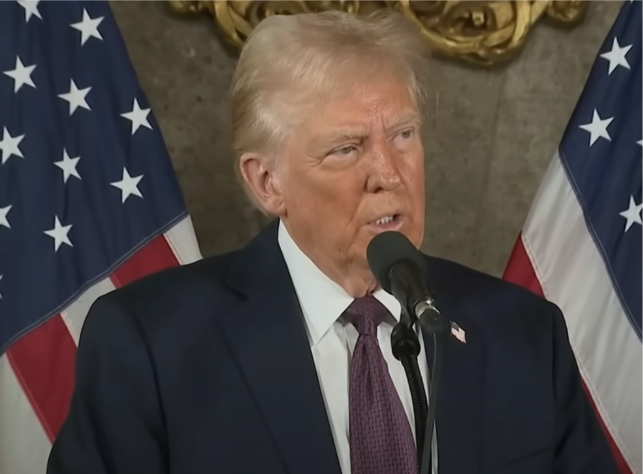News
Trump Continues Rhetoric About Acquiring Canada Even As Trudeau Says ‘Not a Snowball’s Chance in Hell’

Source: YouTube
President-elect Donald Trump reignited his controversial desire in acquiring Canada and merge it with the United States as the 51st state. In a recent press conference at Mar-a-Lago, Trump suggested the move would enhance national security and economic stability. His plan, which involves the threat of substantial tariffs on Canadian goods, drew a sharp rebuke from outgoing Canadian Prime Minister Justin Trudeau, who stated there isn’t “a snowball’s chance in hell” for such a union.
Trump’s Economic Threats Against Canada
Trump’s threat to impose tariffs on Canadian imports underscores his broader strategy of using “economic force” to achieve geopolitical goals. Currently, nearly C$3.6 billion in goods and services cross the U.S.-Canada border daily. Imposing tariffs could severely disrupt this trade flow, damaging industries on both sides.
For Canada, industries like automotive manufacturing and energy production, which heavily rely on U.S. markets, would face significant setbacks. Ontario Premier Doug Ford emphasized this economic interdependence, noting that Ontario supplies electricity to millions of American homes and businesses. However, Ford also took a defiant stance, suggesting that Canada should counter Trump’s proposal by “buying Alaska and Minnesota instead.”
Can Trump Realistically Acquire Canada?
Despite Trump’s confidence, the feasibility of acquiring Canada and integrating it into the U.S. remains highly questionable. Apart from the legal and political hurdles, the cultural and economic disparities between the two nations would pose significant challenges. Trudeau’s resolute rejection of the idea reflects Canada’s strong national identity and its historical resistance to U.S. annexation.
Economically, Trump’s tariff threats could backfire, as Canada has hinted at counter-tariffs that would harm American industries. Moreover, Canada’s commitment to bolstering its military spending and enhancing border security undermines Trump’s narrative of an over-reliance on the U.S. for defense.
A Recent History of Bold Territorial Proposals
The obsession with acquiring Canada isn’t the first time Trump floated ambitious territorial ideas. In 2019, he openly expressed interest in acquiring Greenland from Denmark, describing the island as strategically vital due to its location in the Arctic and its untapped natural resources. Trump characterized the purchase as a potential “real estate deal of the century,” highlighting Greenland’s importance for both military and economic reasons. When Denmark refused, calling the idea “absurd,” Trump canceled a planned state visit, sparking diplomatic tensions.
Similarly, Trump has suggested regaining control of the Panama Canal, a vital trade route that was transferred to Panama in 1999 under the terms of the Torrijos-Carter Treaties. Trump has repeatedly criticized this handover, arguing that American control of the canal would secure its dominance in global trade. While discussing these territorial ambitions, Trump has not ruled out the use of military solutions. He has hinted at the strategic advantage of a military presence in both Greenland and the Panama Canal, suggesting that such measures could be necessary if negotiations fail.
These proposals align with Trump’s broader vision of fortifying the U.S.’s geopolitical position through territorial expansion and control of key global assets. However, they have frequently provoked international criticisms, with officials warning that such aggressive rhetoric risks alienating allies and escalating global tensions.
A Political Gambit or Serious Plans?
Trump’s rhetoric on acquiring Canada resonates with his core supporters, who value his bold, unconventional approach. However, such statements risk alienating U.S. allies and escalating tensions with Canada, one of America’s most significant trading partners. By framing the proposal as a national security issue, Trump aims to justify his aggressive tactics, yet the economic and diplomatic fallout could undermine these efforts.
Whether Trump’s plans for acquiring Canada is a genuine strategy or a political bluff remains unclear. His history of audacious proposals suggests a calculated attempt to shift attention and assert dominance on the global stage. However, Canada’s unwavering opposition, coupled with the economic risks, makes such a merger improbable. As Trudeau quipped, there truly seems to be “no chance in hell” that the US will be acquiring Canada in the near future.
Will Trump follow through on his public plans to expand US territory by acquiring Canada, Greenland, and the Panama Canal? Tell us what you think!
Why is Trump obsessed with expanding US territory by acquiring Canada, Greenland, and the Panama Canal? Tell us what you think.



